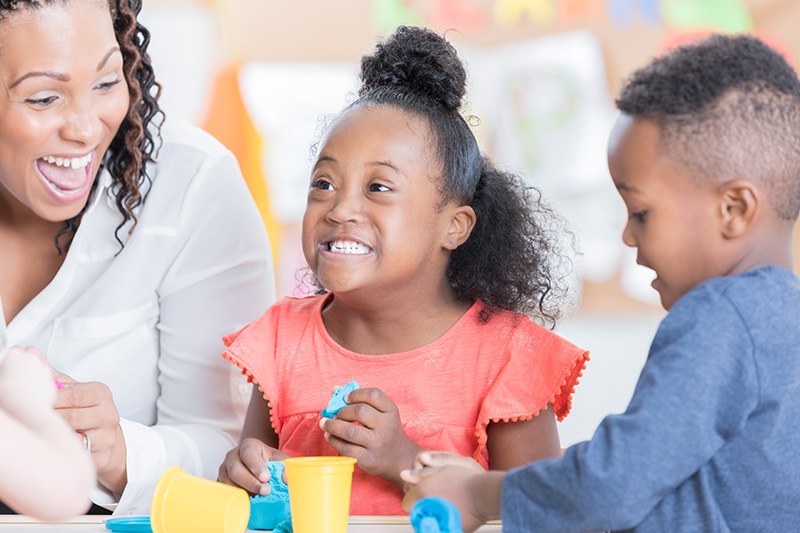Posted: February 12, 2024
"Kindness and caring are prosocial behaviors that build positive interpersonal connections and can uplift both the giver and receiver" (Fryburg, 2021, p. 89).

Smiling preschooler with a teacher and friend, playing with play dough.
Educators nurture caring interactions with children by recognizing and fostering children's emotional well-being, strengths, and interests. When children feel safe, accepted, and respected and can form strong relationships with others, they develop a healthy sense of self. Relationships grounded in kind and caring practices help children feel secure in their daily activities, build confidence, and feel they belong to the classroom community.
Kindness and caring are foundational social-emotional learning traits for growing responsive and warm relationships with children. Adult's caring relationships with children positively impact children's social-emotional growth and development. When educators show care and kindness to children, they model prosocial behaviors. Children see behavior and hear words that support and uplift rather than undermine and dismantle. Some examples of prosocial behaviors include sharing, helping, comforting, and cooperating.
Three strategies to support kind and caring behaviors
Listen to what children have to say and recognize how children feel
As children arrive in your program, greet them warmly and ask how they feel. Notice how children feel throughout the day and respond in a way that supports each child in the moment. Talk with children and take their lead in conversation. For example, "You sound excited about your trip to see your grandma! What do you like to do when you visit her?" Consistent and caring interactions throughout the day contribute to positive teacher-child relationships.
Take a strength-based perspective
A strengths-based approach to learning means that educators focus on what children can do as a springboard for children's learning and development. Educators provide rich learning experiences grounded in knowledge of each child's development, culture, and language. Educators view all children as capable and able to learn, grow, and succeed. Encourage and acknowledge children's efforts as they play, interact, build new skills, and problem-solve. Be a champion for children's efforts and successes using specific, affirming, and positive language. For example, "You and Iris worked hard on figuring out how to put the puzzle together. Great thinking and working together, friends!"
Fill your care and kindness cup
Educators need to care for themselves to support and care for young children. Practicing self-care and self-kindness can help one balance day-to-day stressors and grow the capacity to give to others. "When we respond to ourselves with warmth, we feel validated, supported, and encouraged, in a similar manner to how we feel when we receive kindness from another" (Neff, 2023, p. 195). When we feel care and kindness toward ourselves, we expand our capacity to feel care and kindness toward others. A primary way to fill your care and kindness cup is to find a team that encourages and supports your well-being. For example, this may be other educators in your community, friends, or family. Another way to nurture your well-being is to practice caring and kind acts in daily life. When we practice caring acts, we activate our brains in a way that opens pathways to show care, kindness, and compassion toward others.
References:
Fryburg, D.A. (2021). Kindness as a Stress Reduction-Health Promotion Intervention: A Review of the Psychobiology of Caring. American Journal of Lifestyle Medicine, 16(1), 89-100.
Neff, K.D. (2023). Self-Compassion: Theory, Method, Research, and Intervention. Annual Review of Psychology, 74, 193-218.

